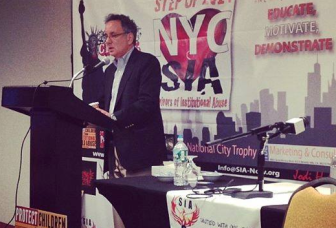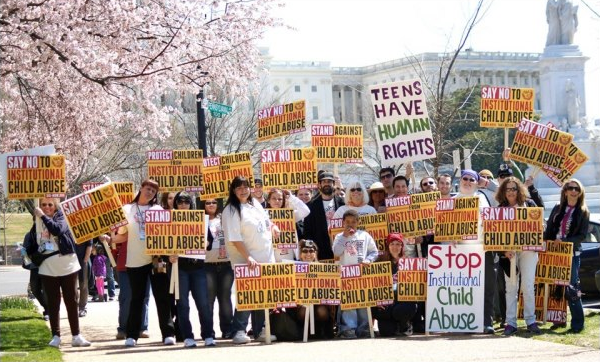
Courtesy Survivors of Institutional Abuse
NEW YORK — Erica Harvey began displaying signs of mental illness in the eighth grade. Her mother, Cynthia, says Erica began cutting herself, became depressed and then suicidal, and started medicating herself with illegal drugs, which were made even more harmful by mixing with the psychotropic drugs she had been prescribed by her psychiatrist. That psychiatrist, along with Erica’s therapist, recommended to Erica’s parents that she be placed in a residential treatment facility.
When Erica was 15, her parents, desperate to find help for their oldest daughter, signed her up for Catherine Freer Wilderness Therapy Program in Nevada. After comparing several programs, they chose Catherine Freer because it was a leader in the industry, and they said they had experience working with youth on psychotropic medications. They were advised not to tell their daughter where she was going until they had arrived.
“Of all the many profound and tormenting regrets we have about our terrible decision,” her mother said, “agreeing to deceive Erica is one of the worst.”
Cynthia Clark Harvey was one of a group of parents on a panel last week, made up of family members of kids who have been abused in institutions. The Survivors of Institutional Abuse conference, which hosted the panel, is in its third year of raising awareness for systemic abuse in drug rehabilitation programs, foster homes, and wilderness camps like the one Erica went to.
But Erica wasn’t lucky enough to be a survivor.
On Erica’s first day of her wilderness trek, she became ill and was forced to keep hiking for hours. She died that afternoon of heat stroke and dehydration.
Clark Harvey testified before a congressional committee in 2007, and she re-read her testimony for the panel and the groups of survivors and their supporters gathered at the New Yorker Hotel. She recounted the horrific details of her daughter’s death.
“When Erica’s eyes rolled into the back of her head and she fell off the trail head-first into rocks,” Clark Harvey read, “she was left to lie where she fell for 45 minutes while two Catherine Freer staffers, still unwilling or unable to recognize what was happening, watched Erica die a slow painful death.”
“I am grateful to be here to talk to survivors,” Clark Harvey told the crowd. “I wish my daughter was a survivor. Even if we didn’t have a relationship. But I would rather have her here on this Earth disappointed in what her parents chose and what happened to her, than not have her here.”
The panel was put together and moderated by Nick Gaglia, a survivor of abuse at a drug rehabilitation center called Kids of North Jersey, where he lived from ages 14 to 17. He’s now a filmmaker whose films focus on institutional abuse, including one, “Over the GW,” that’s based on his own story.
He said the panel is extremely important to understanding this kind of widespread abuse.
“You never hear the parents side of the story,” Gaglia told the crowd. “It’s easy to understand, ‘Well I was a kid, I was abused, I was raped’; that’s an easy argue. But you don’t hear how the parents are deceptively marketed to, how they’re manipulated, and in a lot of cases how they’re abused as well.”
Because parents are the ones who seek the treatment programs for their kids who are often troubled and acting out, they can be vulnerable to claims made by these programs that they can “fix” their kids — for a price. Many of these camps and treatment centers cost thousands of dollars and many aren’t covered by insurance. And a Government Accountability Report found that 33 states reported a total of 1,619 cases of abuse in 2005 alone, and the report notes that without solid nationwide statistics, the number is most likely much higher.
“It’s an incredibly important part of the story, because it’s the parents who are in charge of the kids and they are the ones who make the decisions,” Gaglia said. “In the US, if you are a human under the age of 18, you don’t have the constitutional right to sign yourself out of someplace and get yourself out of there if there’s trouble. You’re trapped.”
Joan Maso, whose daughter also was a part of Kids of North Jersey for two and a half years, said she tried the inpatient facility after her oldest daughter’s mental illness became too much for her family to handle. Maso said the company used fear and manipulation to discourage her from taking her daughter out of the program.
“They grab you when you’re desperate,” Maso said. “Every time I would have a doubt, they’d come back at me and say, ‘Do you want your child to die?’”
Maso said the program took a toll on their whole family, including her younger daughter, who was also manipulated and encouraged to “report” bad behavior to the program.
“Although the experience was different for me as a parent, the mind control was the same,” Maso said.
Maso lives with a lot of guilt about her decision, but said she’s lucky that her daughter made it through the program. Bob and Sally Bacon aren’t so lucky. Their son Aaron was killed in a Utah wilderness camp in 1994. They’d sent him away to gain a new perspective and get away from drugs; his emaciated body was returned to them less than a month later, more than twenty pounds lighter and almost unrecognizable.
Through Aaron’s diary entries and testimony during a trial of the owners and counselors brought by the state of Utah, the Bacons found out their son had been periodically starved, forced to sleep with no blanket or sleeping bag in freezing temperatures, and had lost control of his bodily functions days before his death, all the while still being forced to hike.
“As we went through the trials and watched these young kids as counselors on the stand it became really clear that these kids were abused, too,” Bob Bacon told the crowd. “They were led to believe that this is how you treat people in the name of love. That this is how you should behave when you have your own children. This is how you discipline. And that was heartbreaking.”
The trial resulted in community service for all but one of the counselors, who was jailed briefly. The program, North Star, has since shut down. The wilderness program where Cynthia’s daughter Erica died shuttered their Nevada program but continued to operate in Oregon until late 2012. Through their tragedy, the families have become aware of the scope of these programs and the harm that they’ve done.
“What we learned is that there’s actually an industry that abuses kids in the name of love and in the name of therapy and in the name of helping. It was an awful awakening,” Bob Bacon said. “And that industry operates largely in the regulatory cracks. They’re not too good from what I can tell at actually helping children, but they’re great at marketing, great at mind control, really excellent at abuse.”
Now they take part in panels like this one and take calls from concerned parents who are thinking about sending their kids to programs like the one in which Aaron Bacon spent his last days.
“Our hope is that we have opportunities like the one we have today to awaken parents to the risks involved in these programs,” Bacon said. “We tell them: Do not put your child in a program where the policy is no communication. Do not put your child in a program where they are in isolation. There are so many things to look out for that parents are just unaware of.”


I was sent on a 21 day Catherine Freer Wilderness Trek when I was 16, and I can tell you with a pretty high degree of confidence that I likely wouldn’t be alive today (I’m now 31) if it weren’t for that program. My parents would almost certainly tell you the same thing. For the first two weeks or so I absolutely hated it and hated my Dad for sending me there (My mom was in prison at the time). I stubbornly resisted the program in every way I could until about the 2 week mark when the psychologist and counselors had each of us kids in the program read letters that our parents had written prior to us leaving on our trek about the devastating impact that our behaviors/addictions was having on them out loud in front of everyone else. Half way through my Dad’s letter I broke down. I knew at that point that I needed to make a change and I took full advantage of the time we had left on our trek. I didn’t know this at the time, but the staff stay in regular contact with the parents during the trek via sat phone and e-mail. Upon completion, all the kids, staff, and parents were reunited to discuss how each of us had done over the last 21 days, as well as any recommendations the treatment staff had as far any additional treatment they thought that we might need. Up until the night we read our impact letters, they were planning on recommending additional treatment for me in the form of another 21 day trek with continuing aftercare. But that night I decided to start taking advantage of the opportunity I had been given to truly seek, find, accept, and eventually to learn to love myself again. The progress I made in the last 7 days was transformative. Having witnessed this, the staff let me go home with my Dad after that one 21 day trek. I was miserable for much of my time in that canyon, but when I look back on it with the perspective I have today, I feel nothing but the deepest gratitude and appreciation for the staff at Catherine Freer. It clearly isn’t the right program for every troubled teenager in every circumstance, but something happened to me during my time in that desert canyon that changed the trajectory of my life… And I can’t deny that fact.
I was one of these kids sent to Catherine Freer. The “tough love” they gave us was excruciating. I lost 30 pounds on the 3 week treck. Had to boil “cow pond” water to drink, full of mud. I appreciate the skills (how to build a fire, ration food etc) they taught but I am glad it was shut down.
I suggest that parents find out if the placement they are seeking for their child is a for profit or a non profit program. I would find out if the programs are licensed by the state and have been accredited by a national organization that reviews best practice in youth care work. Too many places have created slick brochures that tell the version of the program’s operation that the owner wants parents to believe. When profit is a motivator, a lot of things can be “overlooked”.
Pingback: Families Open Up About Trauma at Conference for Survivors of Institutional Abuse | roxanna asgarianroxanna asgarian